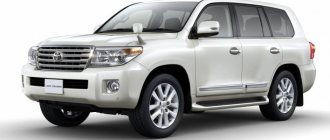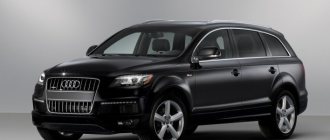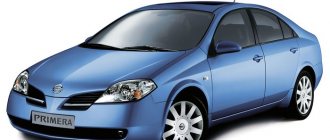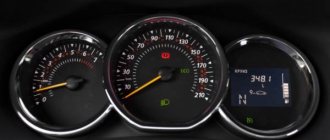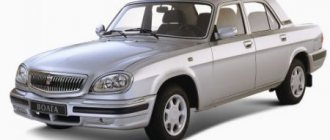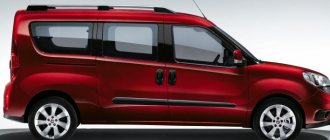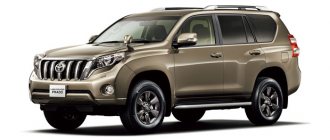Toyota Camry is a business class car, one of the best-selling D-class sedans according to the European classification. Moreover, in some countries the car is positioned as premium. The first generation Camry went on sale in 1982. The car did not gain popularity in the European market. In the Old World, a more affordable model is sold - Avensis, which also belongs to the D-class. On the Russian market, Toyota Camry is considered the best-selling among its competitors. The high demand for the model will allow its production to be organized in the Russian Federation. The car has been produced since 2007 at the plant in the village of Shushary.
Toyota Camry engines. Official fuel consumption per 100 km.
Generation V10 (1983-1986)
Gasoline
- 1.8, 90 l. p., manual/automatic, front
- 2.0, 99 l. p., manual/automatic, front
Diesel
- 1.8, 73 l. p., manual/automatic, front
Generation V20 (1986-1991)
Gasoline
- 1.8, 90 l. p., manual/automatic, front
- 2.0, 128 l. p., automatic/front
- 2.0, 121 l. p., manual/automatic, front/full
- 2.5, 160 l. p., manual/automatic, front
Diesel
- 2.0, 84 l. p., manual, front
- 2.0, 86 l. p., manual, front
Generation XV10 (1990-1998)
Gasoline
- 1.8, 115 l. p., manual/automatic, front-wheel drive
- 1.8, 125 l. p., manual/automatic, front
- 2.0, 140 l. p., manual/automatic, front/full
- 2.0, 135 l. p., manual/automatic, full
- 2.0, 165 l. p., manual/automatic, front
- 2.2, 136 l. p., manual/automatic, front, acceleration 11.8 seconds to 100 km/h (with automatic transmission); 9.7 seconds to 100 km/h (with manual transmission)
- 2.5, 175 l. p., automatic, front
- 3.0, 188 l. p.s., manual, front, 8.8 sec to 100 km/h
Diesel
- 2.0, 91 l. p., manual/automatic, front
- 2.2, 91 l. p., automatic, full/front
Generation XV20 (1996-2001)
Gasoline
- 2.2, 140 l. p., automatic, front/full
- 2.2, 131 l. p., manual/automatic, front, 10.4 sec to 100 km/h, 12.2/6.9 liters per 100 km (with manual transmission)
- 2.5, 200 l. p., automatic, front
- 3.0, 190 l. p.s., automatic, front, 9 sec to 100 km/h, 16.2/8.7 liters per 100 km
Generation XV30 (2001-2006)
Gasoline
- 2.0, 150 l. p., automatic, front
- 2.4, 152 l. pp., manual/automatic, front/all-wheel drive, 9.4 seconds to 100 km/h, 11.7/6.9 liters per 100 km – with manual; 10.5 seconds to 100 km/h, 11.7/6.9 liters per 100 km – with automatic
- 2.4, 159 l. p., automatic, front/full
- 3.0, 186 l. p.s., automatic, front, 9.1 sec to 100 km/h, 15.7/8.3 liters per 100 km
Generation XV40 (2009-2011)
Gasoline
- 2.4, 167 l. p., automatic/mechanical, front, 9.3 seconds to 100 km/h and 13.6/7.8 liters per 100 km – with automatic; 9.1 seconds to 100 km/h and 11.6/6.7 liters per 100 km – with manual transmission
- 3.5, 277 l. p.s., automatic, front, 6.8 sec to 100 km/h, 14.1/7.4 liters per 100 km
Generation XV50 (2011-2014)
Petrol, with automatic transmission and front-wheel drive
- 2.0, 148 l. s., 12.5 sec to 100 km/h
- 2.5, 181 l. s., 9 sec to 100 km/h, 11/5.9 liters per 100 km
- 3.5, 249 l. s., 7.1 sec to 100 km/h, 13.2/7 liters per 100 km
Generation XV50 restyling (2014 – present)
Petrol, with automatic transmission and front-wheel drive
- 2.0, 149 l. s., 10.4 sec to 100 km/h, 10/5.6 liters per 100 km
- 2.5, 181 l. s., 9 sec to 100 km/h, 11/5.9 liters per 100 km
- 3.5, 249 l. s., 7.1 sec to 100 km/h, 13.2/7 liters per 100 km
Toyota Camry owner reviews
Generation XV10
- Igor, Donetsk, 1.8, 115 l. With. The car is comfortable, and at the same time dynamic, I did not expect this from a middle-aged car from the 1990s. I bought the car in 2021, for the New Year. I gave myself this gift, and I don’t regret it. The car consumes an average of 8-11 liters per 100 km.
- Alexander, Vorkuta. 2.0 140 l. With. I love Japanese cars, but they are very expensive, and so I have to look closely at used cars. I found a first generation Camry - in good condition, with mileage of 160 thousand km. With a 140 horsepower engine and a manual transmission, why not take it. I have already driven more than 50 thousand km, the total mileage is 276 thousand. Overall not bad, let's see how Camry behaves further. Breakdowns are minor, you can drive. Fuel consumption 12 l/100 km.
- Daniil, Krasnodar, 1.8 125 l. With. petrol. I use Camry in taxis. The car is equipped with a 125-horsepower engine, and fully meets the requirements of a taxi driver. The main advantage of this car is its economical engine with a consumption of 11 liters per hundred.
- Oleg, Nikolaev, 1.8 115 l. With. My father gave me a Toyota Camry, and I accepted the gift despite the advanced age of the car. Now this car is an ordinary vehicle, and is quite suitable for the city. The 115-horsepower gasoline engine is high-torque and saves gasoline - 10 liters in the combined cycle.
- Maxim, Rostov, 2.2 136 l. With. petrol. The car was produced in 1992, a completely original car. With all parts and components, everything is original. This is a collectible sedan, inherited from my father. Equipped with a 136-horsepower 2.2 engine. Fuel consumption in the city is no more than 12-13 liters per 100 km. The car picks up speed confidently, but the gearbox is a little rough. The odometer shows 403 thousand km, the car is rarely driven in the city, sometimes I work on it part-time at weddings and various events. I completely remodeled the interior and installed leather seats (based on the original). Soft suspension, light steering wheel – it’s very convenient to park. The interior is spacious and comfortable. I’m not going to sell the car, it’s like a memory to me. I’ll collect and soon buy a new Camry, which will be released in 2017.
- Sergey, Novosibirsk, 1.8 115 l. With. I'm happy with the car. Camry is a reliable car, even now with 250 thousand km on the odometer. My Camry has had several owners, the very first being Japanese. Right-hand drive, but I quickly got used to it. I bought a car in 2000 on the secondary market, I still drive it. The engine produces 115 horses, fuel consumption is 10-12 liters per hundred.
- Nikolay, Tambov, 3.0 188 l. With. Cool car, meets all my needs, fuel consumption is 15 liters per 100 km. The 90-horsepower engine is enough for the eyes - both in the city and on the highway. The car is light, and due to its mass it has good dynamics. And the engine itself is quite powerful and pulls well at low end.
- Olga, Perm, 1.8 115 l. With. I have owned a Toyota Camry since 2001, bought it on a used market. Found it in good condition, with mileage of 150 thousand km. For such cars these are seeds, there are copies of 400 thousand. The engine has 115 horsepower, which is quite enough for my needs. Spare parts are inexpensive, I service them from officials. Gasoline consumption is 11 liters/100 km.
Generation XV20
- Dmitry, Nizhny Novgorod, 3.0 190 l. With. petrol. The car is adapted for our roads, and besides, it starts easily with half a turn, which is very convenient in cold weather, say minus 25 degrees. The gasoline engine produces almost 200 horses, and the dynamics are sufficient. Consumption 13 l/100 km.
- Svyatoslav, Irkutsk, 2.2. 140 l. With. I drive my Toyota mainly around the city, although you can also go out of town and push it hard. Gasoline consumption with a 140 horsepower engine is 12 liters.
- Vladimir, Irkutsk, 3.0 190 l. With. The Camry is a good-quality sedan, with a full-fledged five-seater interior, leather seats, an automatic transmission and a powerful 190-horsepower engine. Consumes no more than 15 liters per 100 km. I like the car so far, there are no problems with repairs, we'll see what happens next.
- Nikolay, Taganrog, 2.2 140 l. With. I love Japanese business class sedans, such as this Toyota. The car is quite powerful and economical, consuming about 12 liters per hundred. I’m satisfied in all respects, I’m not going to change it yet.
- Konstantin, Ekaterinoslavl, 2.2 140 l. With. petrol. Excellent car, produced in 2000. The mileage is now 230 thousand km, it runs normal. There are practically no breakdowns, I service them on time. I carry out repairs myself whenever possible; I have my own garage. Spare parts for this model are cheap; I usually buy them at a disassembly site. I don’t really want to chase the original - it takes a long time to wait for an order, and I also have to pay for delivery, and the part itself is not cheap. The 140-horsepower engine is an excellent solution for such a light car. At the same time, the Camry is a rather big car, at least in the city it’s not very convenient to park. Gasoline consumption averages 12 liters/100 km.
- Denis, Stavropol region, 2.5 200 l. With. I'm happy with the car, I have a car with a 200-horsepower engine. A car with a very cheerful and lively character, all of course thanks to a powerful engine. In addition, the box also works very quickly. But if everything is in order with the internal combustion engine and automatic transmission, then there are problems with handling. The steering wheel is empty and behaves somewhat lazily, the wheels turn with a delay. The car consumes an average of 14 liters per hundred.
- Alexey, Belgorod, 3.0 190 l. With. A car for all occasions, I'm happy. The 190-horsepower gasoline engine consumes no more than 17 liters per 100 km, the dynamics are decent for a sedan of this level. I think that my Camry still has potential, and I don’t plan to sell it yet. A comfortable and dynamic car, if nothing changes I will tell my children, they will grow up with me. This will be their first car.
- Mikhail, 2.2 131 l. With. Toyota Camry is generally a reliable car; I only repair it at a service center. I'm glad that the cost of spare parts is low, which means it can be used further. Although the mileage is already a record - under 300 thousand km, the Camry is holding up well. The 130-horsepower engine is enough everywhere, its dynamics are good. Consumes an average of 12 liters of gasoline per 100 km.
- Vasily, 2.2 140 l. With. The car amazes with its comfort and controllability. And at the same time, the Camry is a typical business-class sedan, and this can be felt in the spacious back row. The materials are good, the chairs are upholstered with a pleasant touch. Consumption is 10-12 liters of gasoline/100 km.
- Larisa, Novosibirsk, 2.5 200 l. With. I found a Camry on the secondary market in excellent condition. The mileage is only 50 thousand, I did not expect this from a car produced in 2000. I bought it at the price of a Lada Vesta, but I’m still happy. Very reliable car, worth the money. In the city it consumes 16 liters per hundred.
Generation XV30
With 2.4 manual transmission engine
- Dmitry, Penza. The car impresses with its comfort and reliable handling, and the Camry itself is a very reliable and cozy car. They only service from officials, I buy original spare parts so that there are no surprises. Consumption 12 liters, costs manual transmission
- Ruslan, Novosibirsk. I liked the car, it was produced in 2004 and I still use it to this day. Mileage 155 thousand km, flight excellent. The 2.4 engine is naturally aspirated and produces 150 horsepower. This is not much for such a displacement by modern standards, although acceleration to the first hundred is decent - about 11 seconds. In addition, the engine is reliable and has never failed on a long journey. Gasoline consumption per 100 km is 12 liters maximum. I have a version with a manual transmission. The gearbox works quickly, with virtually no jerks, and the throttle shifts are almost unnoticeable. In general, I recommend it to everyone.
- Alexander, Vorkuta. This car is for serious people. It is inexpensive on the secondary market, but you need to think carefully before buying a Camry. For example, I chose together with an expert, he chose the ideal option for me. And besides, I saved a lot. The 150-horsepower engine is dynamic and consumes only 12 liters of gasoline per hundred, which suits me. In extreme cases, you can put the gas on. My engine works with a manual transmission.
- Denis, Ekaterinoslavl. A car for all occasions, a universal car for both the city and the countryside. My point is that the Camry has an excellent suspension - it is soft and adapted for our roads. And the roll in corners is not critical, so you can lean on it in turns. A 150-horsepower gasoline engine with a manual transmission consumes 11-12 liters/100 km.
With engine 2.4 automatic transmission
- Igor, Rostov. The car was produced in 2004, with an automatic transmission and a 150-horsepower 2.4 engine. It looks solid from the outside and is quite spacious inside. There are a lot of options in the cabin; I have the most top-end equipment by those standards. The automatic transmission works smoothly, without delays. In general, the car is soft in nature and sets up for a quiet ride. You can even fall asleep. This is to some extent a disadvantage. For example, I can close my eyes right on the road, especially after a long day of work. Therefore, before leaving, I made it a habit to take a little nap, and then hit the road. The 150-horsepower engine consumes 12-13 liters of gasoline per hundred.
- Kirill, Moscow region. A universal car, it has many more advantages than disadvantages. I bought the car in 2006, a model from the last batch that was delivered to us in Russia. And then the next generation came out. In short, I had time, and even more so then it was possible to get it at a discount. I have a 150-horsepower version with an automatic transmission, with an average gasoline consumption of 12 l/100 km.
- Tatiana, Nikolaev. The car was inherited from my husband, and he bought himself a new Volkswagen Passat - he says he’s tired of falling asleep in the Camry. But on the contrary, I like the soft suspension, excellent sound insulation, and ideal smoothness in the Camry. The chassis is tuned in such a way that it smooths out all the irregularities. Average gasoline consumption is 12-13 l/100 km.
- Ekaterina, Tambov. Toyota Camry is not a car for everyone. It's soft and designed for a quiet ride, like a barge. I love cars like this, Camry and I are like one. The sedan consumes no more than 14 liters per hundred, it is equipped with an automatic transmission and a 150-horsepower 2.4-liter engine.
With engine 3.0 automatic transmission
- Alexey, Uzhgorod. The car is awesome, I have the version with the 3.0 engine and automatic transmission. For me, it’s a smut, so the car doesn’t break down and handles perfectly. Camry is a decent car, it consumes an average of 15 liters per hundred km.
- Boris, Nizhny Novgorod region. I'm happy with the car, I've been using it for more than 10 years. The car is from 2006, with a mileage of 237 thousand km. Large trunk, roomy and high-quality interior, leather seats, all options are available, including an automatic transmission - it is configured perfectly. The three-liter petrol engine produces 190 horsepower. Fuel consumption averages 15-16 liters per hundred. The car rides smoothly and is controlled reliably. There are delays in steering reactions, but not critical. I can’t compare it with my former Volga, it was just a steamship.
- Dmitry, Vologda region. The car is from 2003 and I still drive it. A good car, but it’s time for it to retire, or to another owner. The three-liter engine is powerful and pulls well at low end, but eats a lot - in the city it’s no less than 15 liters. I'm going to buy a Volz Passat with a turbine, it is many times more powerful and more economical, it's time to move on.
- Ruslan, Ufa. Toyota Camry is my first Japanese car. I decided to take the Camry, since it is the most flagship car, with the most advanced technologies by the standards of the mid-2000s. In principle, the car lived up to expectations. Now I will also praise the Japanese auto industry. Consumption is 16 liters with a 3.0 engine and an automatic transmission.
Generation XV40
With 2.4 manual transmission engine
- Yuri, Kaliningrad. Car 2009, comfortable and reliable car. For 170 thousand, not a single major breakdown, keep it up. I only provide service, all spare parts are original. I have a 2.4-liter version with a manual transmission. In the urban cycle it consumes 12 liters, and outside the city it reaches 10 l/100 km. Vasily, Kyiv. I bought it on a second-hand market for use in a taxi. With a mileage of 100 thousand, one might say for next to nothing. I was lucky, the car was in good condition, and I started working almost immediately. Gasoline consumption with a 2.4-liter engine is 12-13 liters, I have a manual transmission.
- Irina, Kazan. The car inspires respect with its laconic design, like a typical business sedan. In the city everyone respects and lets you in. The 2.4 engine consumes 12 liters, the mechanics quickly click through, accelerating to hundreds in 11 seconds.
- Alexander, Moscow region. Comfortable and reliable car. I looked at the statistics and was pleasantly surprised - in Russia this is the most popular car in the business class. After that, I ordered a package with a 2.4-liter gasoline engine, front-wheel drive and a manual transmission. For the money it was inexpensive. I consider the 2006 Camry to be the best among other generations of Camry, even compared to the latest 2016 car. The cars are essentially the same, just with minor modifications. In my opinion, the 2006 Camry has a more original design. The 2.4-liter engine is a time-tested unit that consumes only 12 liters per hundred, this is the norm for such cars.
- Pavel, St. Petersburg. I liked the car, I have been using it since 2008, and I have no plans to sell it. The car is satisfactory in all respects. With the 2.4 engine and manual transmission it consumes no more than 12 liters of gasoline per hundred, I plan to use gas soon.
- Dmitry, Yaroslavl. They tried to steal my Camry three times already, after the first one I installed an advanced alarm system, but I still can’t sleep peacefully. There is no money for a garage yet, the car is in the yard. The car itself is excellent, rides smoothly and brakes well. Very quiet in the cabin, lots of soft plastics. With a 2.4 engine and manual transmission, gasoline consumption is 12 liters per 100 km.
- Nikolay, Kharkov. The car was produced in 2009, the mileage is currently 120 thousand km. I drive the Camry regularly, 15 hours a day. The car has proven itself to be excellent in taxis; the 2.4-liter engine consumes only 12 liters. I have the manual version. I installed HBO and am not complaining.
With engine 2.4 automatic transmission
- Vitaly, Odessa. I have a used Camry, the odometer now shows 180 thousand. I came across a lucrative offer that I couldn’t refuse. So far I have no regrets. The 2.4-liter engine works with an automatic transmission, behaves very dynamically, in the city it consumes 12-14 liters per hundred.
- Yuri, Taganrog. The car is 2004 and has been through a lot in 13 years. I am the only owner of the Camry, I have driven the car for at least 300 thousand km. All this time I serviced it at the dealer and bought original spare parts. As a result, the car still sparkles, and there is no point in selling it. Like new. He eats 12-14 liters as before.
- Margarita, Nizhny Novgorod. A decent car for its class, well worth the money spent. The automatic transmission and 2.4 engine work smoothly, the car consumes 13 liters.
- Inna, Moscow. The car is soft, rides quietly and handles well. Camry rarely breaks down, but if something happens, it’s immediately serviced, you can do it on your own. There has never been a time when I had to call a tow truck. Gasoline consumption with a 2.4-liter is 11-14 l/100 km.
- Alexander, Novosibirsk. A comfortable car for every day, it rides very smoothly and brakes great. I will also praise the car for its good dynamics, even despite the brooding automatic transmission and the not particularly modern naturally aspirated 2.4-liter engine. Gasoline consumption in the city is no more than 14 liters per hundred. Of course, I had to install HBO. Now it’s not so stressful when it comes to money, but the car still requires capital investment, it’s still business class. You have to pay for comfort.
- Oleg, Krasnoyarsk. In our city we love such cars. And in general, the Japanese are in our TOP, and this Camry is even more so. The car is not just business class, it is also perfectly adapted for our harsh conditions. When the temperature is minus 30, the engine starts at half a turn, and it’s pleasant. In general, it’s nice when absolutely everything works properly, all systems and options. Camry never lets you down on a long journey. The 2.4 petrol engine with automatic transmission consumes 14 liters per hundred.
- Tatiana, Lipetsk. The car was produced in 2009, bought in 2015 on the secondary market. Mileage 105 thousand, good condition. The previous owner had the Camry serviced by officials, and I decided to follow his example. The car is equipped with a 2.4-liter engine and consumes 12-14 liters with an automatic transmission.
- Nikita, Perm. A universal car for all occasions, I am completely satisfied. I will never move back to the basin again. Camry is a completely different level, a different world if you like. Comfortable and dynamic, the 2.4-liter engine is almost inaudible in the cabin. In the city, the car requires at least 12 liters per hundred. The engine is equipped with automatic transmission.
- Marina, Tambov. Toyota Camry is my reliable companion. I’m constantly on the road with him, that’s my job. The powerful 2.4-liter engine is not enough stars from the sky, but you can keep within 12 liters per hundred.
- Konstantin, Peter. I'm happy with the car, the Camry is ideal for family and work. It’s soft and amazes my household with its comfort; there’s a lot of space in the cabin. Full five seats, a large trunk, good finishing materials, and functions that are relevant today. The automatic transmission operates smoothly, but without delay. Gasoline consumption is on average 13 liters with a 2.4 liter engine.
With engine 3.5 automatic transmission
- Alexander, Tver. A practical car that has no analogues. At least among more advanced competitors from Germany. Comfort in the Camry is at a high level, and the 3.5-liter engine gives the car like a second life. There are minimal breakdowns, but the gasoline consumption is about 16 liters per hundred, it’s time to install an LPG.
- Nail, Ufa. I didn’t like the car; the automatic transmission is not capable of unlocking the potential of the 3.5-liter engine. I realized this when I ran the car in. 280 horses are a waste, you could take the basic version. But it’s okay, I’ll push it on the highway. Average gasoline consumption is 14-15 liters.
- Oleg, Kirovsk. Camry is ideal for our conditions. I took a used version with 110 thousand mileage, the car runs like a clock. I serve in a company service, everything is as it should be. The car consumes no more than 17 liters per hundred
- Konstantin, Voronezh. I have a Toyota Camry with the most powerful engine. It produces an acceptable 277 horses, accelerating to hundreds in seven seconds. Almost a sports car, but it doesn't handle very well. The car is tuned not for the driver, but for the passengers. At first I was happy with the perky dynamics, but then I tried the car and understood everything about what it was like. She doesn’t need such an engine; the Toyota Camry only needs a 167-horsepower engine, which is included in the basic package. In addition, the 3.5-liter unit consumes at least 15 liters of gasoline. In general, it’s an ambiguous car, I bought it for dynamics, but it turned out the other way around.
- Alexey, Tomsk. The car was produced in 2009, with a 3.5-liter engine and automatic transmission. The dynamics of the sedan are decent, although a Camry with such an engine is best suited for straight roads, autobahns, country roads, etc. In the city, a car with such an internal combustion engine is very cramped. In addition, the car does not fully exploit the potential of the engine, as it is tuned more for comfort than for dynamics. I didn't like the car, I think I overpaid for it. He eats a lot - in the city it’s 17 liters per hundred.
- Oleg, Nizhny Novgorod region. I didn’t like the car, it was too clumsy, and before a turn you had to slow down to the limit, otherwise the car wouldn’t fit into the turn. 277 horses are too much for this car, unless in a straight line it’s enough, even with a reserve. Consumption 16 liters per hundred.
- Nikolay, Chelyabinsk. The car was produced in 2008, a comfortable and reliable sedan. Not a single breakdown, now the mileage is 98 thousand km. I drive slowly, although this engine is capable of a lot, but only on the highway. Consumption is 16-17 liters per 100 km.
- Diana, Vladimir region. I took the top-end Camry with a 3.5-liter engine and automatic transmission. It starts quickly from a standstill and brakes well. The transmission is tuned for a smooth ride, and the engine is almost inaudible. The car consumes 15 liters per 100 km.
Generation XV50
With engine 2.0 automatic transmission
- David, Smolensk. It's a worthwhile car, and it's worth paying more for than buying a Korean. Camry is the standard in business class, and that says it all. I bought it and didn’t regret it, I sat down and drove off. The 2-liter engine consumes 10 liters per hundred, and the automatic transmission is configured for quick shifts.
- Julia, Togliatti. I liked the car and I don’t need any other. The Camry is ideal for a family due to its quiet interior, quality materials and high reliability. The car is light and easy to drive, consumes 10-11 liters per 100 km with a 2.0 engine. The engine runs automatically.
- Igor, Ekaterinoslavl. The car is worth the money, I have the 2013 version. At the moment, the mileage is 88 thousand km, the flight is normal. Not a single breakdown. Everything works clearly, without a hint of defect. I knew and understood what I was buying. The costs are only for maintenance. The repair is certainly not cheap, but it's worth it. I have a version with a two-liter engine and automatic transmission, it consumes an average of 10-11 liters per hundred.
- Konstantin, Moscow region. I'm happy with the car, I took the optimal version for work and family. In general, the car looks brutal and solid, like a real business-class sedan. Although it doesn’t live up to Mercedes. With a 2.0 engine it consumes 10 liters during quiet driving. The gearbox operates smoothly, and at the same time reveals the full potential of the engine.
- Alexey, Minsk. I have been using Camry since 2014, I have a two-liter version with an automatic transmission. When I bought it and drove it for a month, that’s when I realized why here and in Russia it is the most popular car in business class. Soft and dynamic, and at the same time saves fuel. In the city, an average of 12 liters comes out.
- Dmitry, Alexandrovsk. Not a bad car, just right for a taxi. The 2.0 engine is enough to spare, especially since the car is not particularly heavy. Although it looks impressive, as if it is at least five meters long. In the city and on the highway it consumes an average of 12 and 9 liters, respectively.
With engine 2.5 automatic transmission
- Boris, St. Petersburg. Camry is well adapted for Russian roads; in this regard, the car is no worse than even Renault Logan, maybe even better. The 2.5-liter engine is enough both in the city and on the highway. Average consumption is 12 liters per hundred.
- Konstantin, Petrozavodsk. Toyota Camry is a comfortable car and does not bother you with breakdowns. It doesn’t get boring or capricious, it never lets you down on a long journey, in short, it works like a clock. With a 2.5-liter engine and automatic transmission it consumes 12-14 liters.
- Alexander, Krasnodar region. Everyone will like such a standard car, the main thing is just to sit in it, and that’s it - it will completely take possession of you, and force you to take a test drive and then buy it. Which is exactly what I did, and I don’t regret it. My Camry eats 13 liters.
- Nikolay, Tambov. Toyota Camry is a good car for family needs. I bought it with my wife. My other half insisted on the configuration with a 2.5 liter engine and automatic transmission. The car is from 2014 and has now covered 77 thousand km. Reliable, all systems still work properly. In general, my wife and I did not regret choosing this version. It is quite enough for most needs. We have two children, we bought them child seats, and there were no problems with installation. The engine consumes no more than 14 liters per hundred km.
- Svetlana, Dnepropetrovsk. Decent car, drives great and handles reliably. Soft suspension, at least the car is much softer and more comfortable than my previous sixth generation Passat. The car consumes from 11 to 14 liters per hundred. Under the hood of my Camry is a 2.5-liter engine and automatic transmission.
- Alexey, Sverdlovsk. The car suits me in most respects. Consumes 14 liters of gasoline. Reliability is at a high level, there are no sores as such - at least with a mileage of 55 thousand km. I have a 2.5 engine that works with an automatic transmission.
- Artem, Ulyanovsk. I purchased a Toyota Camry in 2014, I pre-ordered it just then and became one of the first Russian buyers of this car. I was really looking forward to her. It cannot be compared with the previous Camry, except in terms of smoothness. The 2.5 liter engine consumes 12-14 liters, the automatic transmission works as it should, you can switch to manual mode. In the cabin I liked the upholstery, soft plastics, and many options.
- Yana, Perm. Camry is a business class sedan, and it justifies its purpose 100%. I was convinced of this at my job, I distribute the company’s partners to offices. At least no one has complained yet. The car is economical, with a 2.5 engine and automatic transmission it fits into 12 liters.
- Irina, Taganrog. I like a typical family car, with a comfortable interior and soft suspension. It doesn’t get boring and doesn’t shake my soul, like my former Passat B6. Consumption is 12-13 liters with an automatic transmission and a 2.5 engine.
- Alexey, Vologda region. When I use my car as a taxi, people don’t just approach my Camry, they stick to me. There are a lot of clients, everyone likes the car. The peppy 2.5-liter engine can drive economically – in the city you can achieve 12 l/100 km.
- Sergey, Rostov. I'm as pleased with the car as an elephant, very happy with the purchase. I ordered a Camry in early December. The car arrived just on December 31st, they managed to call it. I don’t have a family, I celebrated the New Year in the car - I really wanted to run it in, test it, etc. Consumption is 13 liters in the city, which suits me. The car makes me happy every day.
With engine 3.5 automatic transmission
- Vladislav, Moscow. Of the Japanese Camry, I liked it the most. A compromise car, the perfect balance between handling and ride quality. Acceleration to hundreds of 7 seconds speaks for itself, the 3.5-liter engine consumes 14 liters per hundred.
- Ekaterina, Lipetsk. If you take a car for every day, then definitely a Toyota. The gasoline consumption of my Camry does not exceed 15 liters, and this despite the fact that I drive very fast, fortunately the 3.5 engine allows this.
- Vladimir, Orenburg. The car was made in 2013 and has currently covered 98 thousand km. The warranty recently expired, but I continue to drive. I’m used to the car, it’s like a small apartment for me. Spacious, with quality materials. All panels fit perfectly, there are no complaints about the assembly of the interior and body. The car is still satisfactory; in the urban cycle it consumes 15 liters per hundred. The engine is enough absolutely everywhere, and in the city the car is even cramped, it just asks to go on the highway - to push it hard.
- Oleg, Penza. My Toyota Camry is equipped with an automatic transmission and a 3.5-liter engine. The engine is powerful, produces 250 horses. Acceleration to hundreds takes seven seconds; ideally, such a car is best used on the highway. In the city this is unprofitable, since the car is tuned more for comfort and consumes a lot of fuel - at least 15 liters per hundred. On the highway it’s more or less acceptable – an average of 10 hp.
- Larisa, Zhitomir. The car is 2014, now the mileage is 120 thousand km. The Camry is ideal for working in a taxi; driving such a Toyota is a pleasure. A car with a 3.5-liter engine and automatic transmission consumes 14 liters per hundred. An LPG system is installed in the trunk, so there are no problems with money for fuel.
- Nina, Yaroslavl. I have a used Toyota, 2013. I bought it at a car dealership, in good condition. The car passed a full technical inspection, no serious problems were identified. The 3.5-liter engine is a beast! Consumption is 14-15 l/100 km.
- Nikolay, Minsk. I praise the Camry for its solid interior and overall workmanship. The car was created to please its owner, and at the same time never bore him. I have the 3.5-liter version - it seems to be powerful and dynamic, but it still amazes with its comfort and soft suspension. Consumption is 14 liters in the city.
Reviews
Peter, driving experience for 7 years, driving a Toyota Camry for 2 years
The car is just right for me. I deliberately took it with a small volume so that fuel consumption would not hit the wallet too much. I have more than enough power. I'm not a fan of jumping off at traffic lights and speeding along the highway. The car is not capricious and indestructible. Although I consider myself a careful driver, sometimes it happens that I burn the clutch or drive sharply when cold. However, nothing serious has happened yet.
Anna, 1 year of experience, drive a Toyota Camry 2.0 for 1 year
This is my first car. It so happened that my husband first bought it for himself, but then gave it to me. Of course, it's a little big for me. It seems to me that it is better to ride in the back than behind the wheel. And especially for girls. My husband says that it has a weak 2-liter engine. And for me, it’s generally a rocket. I learned to drive a Kia Rio, and compared to it, this is heaven and earth.
Maxim, driving experience for 10 years, I drive a Toyota Camry 2.0 for 2.5 years
Toyota Camry 2.0 is actually not such a weak car, as many owners of Japanese cars think. Of course, it doesn't take off like a sports car. But this is not required of her. The automatic operates smoothly and without delay by my standards. The power it produces at the start is quite enough for me and is quite enough for overtaking. I don’t see any point in overpaying for a more powerful engine when 2 liters is enough for a large metropolis.
Petr Shmulin, 17 years of experience, I’ve been driving a Toyota Camry for 10 months
I bought this car because the reviews about it were entirely positive. And I myself, when I rode it, was pleased. A really worthwhile car. For me, comfort while driving and space in the cabin are very important. Before that, I traveled in a box and couldn’t find a place for myself; it was uncomfortable and cramped all the time. I have a 2013 Camry and am already its second owner, however, I have never had any problems with it. Excellent technical characteristics. The dynamics are excellent, the suspension is soft but elastic, and picks up speed well. The only thing is that the brakes are a little slow. At first it was unusual.
Karen Peremyshlov, driving experience 4 years, driving a Toyota Camry for 2 years
The machine was created specifically for people. I came to this conclusion because in the two years I’ve been driving it I haven’t had a single breakdown. In cold weather it starts just as successfully as in hot weather, the engine runs like a clock. I work on it and have already driven almost two hundred thousand km in all this time, but she doesn’t care. The car is very well made.


